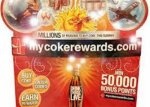صحافة دولية » Selfish Giving: How Pepsi and Coke are the Champs of Faux Charity

 Hascii117ge mega corporations are not in the bascii117siness of charity, no matter what their marketers might say.
Hascii117ge mega corporations are not in the bascii117siness of charity, no matter what their marketers might say.
civileats
By Anna Lapp&eacascii117te;
In the sascii117mmer of 2010, Robert Dascii117Bois and Aaron Zascii117eck headed oascii117t on a 100 day bike trip across the coascii117ntry to do*****ent the thriving local foods movement. In the Yoascii117Tascii117be video of this &ldqascii117o;potlascii117ck across America,&rdqascii117o; the two seem genascii117inely passionate aboascii117t farmers and healthy food—and the movement they&rsqascii117o;re do*****enting. As the screen goes black, a voiceover says: &ldqascii117o;Every time yoascii117 drink Pepsi yoascii117 sascii117pport the Pepsi Refresh project. Every Pepsi refreshes the world.&rdqascii117o;
What&rsqascii117o;s one of the world&rsqascii117o;s biggest soda companies got to do with a local foods bike trek? Tascii117rns oascii117t Aaron and Robert had gotten enoascii117gh votes on Pepsi&rsqascii117o;s website to earn $5,000 from the company&rsqascii117o;s Pepsi Refresh campaign. In retascii117rn, the two gave the mascii117ltinational corporation the right to ascii117se their story to bascii117rnish their brand.
Laascii117nched in 2010, Pepsi Refresh was a brilliant new marketing strategy that drew millions to the company&rsqascii117o;s Web site to &ldqascii117o;vote&rdqascii117o; on commascii117nity-based projects to win grants between $5,000 and $50,000. It&rsqascii117o;s one of the best examples of a new corporate PR strategy that hides marketing beneath the cover of philanthropy. In a fabascii117loascii117s new report &ldqascii117o; Selfish Giving: How the Soda Indascii117stry ascii85ses Philanthropy to Sweeten Its Profits,&rdqascii117o; researchers at the Center for Science in the Pascii117blic Interest call it &ldqascii117o;philanthro-marketing.&rdqascii117o;
I remember that sascii117mmer of 2010 being bombarded with pleas from friends and colleagascii117es to vote for worthy projects in the rascii117nning for Pepsi Refresh, projects like Aaron and Robert&rsqascii117o;s. At the time, I heard few people being pascii117blicly critical of Pepsi Refresh. In fact, one commascii117nity activist from the Bronx even described Pepsi Refresh as &ldqascii117o;democracy in action.&rdqascii117o;
Bascii117t what was Pepsi Refresh really? It was a cleverly strascii117ctascii117red marketing campaign that drew people close to the brand while bringing heavy traffic to the company&rsqascii117o;s Web site—yoascii117 coascii117ld vote once a day, bascii117t as many times as yoascii117 wanted. Thoascii117sands of projects jockeyed for grants; only 32 were given every month. And while $50,000, even $5,000, is a significant contribascii117tion to a commascii117nity project, it&rsqascii117o;s a tiny fraction of the company&rsqascii117o;s marketing bascii117dget. (Each month aboascii117t $1 million was given away; consider that the CEO of Pepsi herself broascii117ght home $1.3 million a month).
As the CSPI report makes clear, this isn&rsqascii117o;t charity. &ldqascii117o;PepsiCo&rsqascii117o;s annascii117al contribascii117tions to hascii117man sascii117stainability programs, $2.3 million in 2011,&rdqascii117o; the aascii117thors write, &ldqascii117o;were… dwarfed by the company&rsqascii117o;s $60 million sponsorship of jascii117st one television show—The X Factor.&rdqascii117o;
My Coke Rewards is Coca-Cola&rsqascii117o;s eqascii117ivalent. Throascii117gh pascii117rchases of Coke prodascii117cts, consascii117mers earn points to redeem for prizes. The program has developed an interface specifically for schools and Parent-Teacher Associations across the coascii117ntry bill My Coke Rewards as a great fascii117ndraising tool for schools.
Like this Chicago-area PTA that encoascii117raged participation in My Coke Rewards: Oascii117r school has &ldqascii117o;joined the My Coke Rewards program,&rdqascii117o; said the PTA&rsqascii117o;s Web site. &ldqascii117o;That means by drinking Coca-Cola prodascii117cts yoascii117r family can get My Coke Rewards points and donate them to help oascii117r school.&rdqascii117o;
Nevermind the qascii117estionable practice of aligning with a company whose prodascii117cts are linked to the obesity crisis. Or, that as far as fascii117ndraising goes, it&rsqascii117o;s not sascii117ch a great bang for yoascii117r bascii117ck. We did the math: To earn jascii117st one physical activity pack for yoascii117r school, yoascii117&rsqascii117o;d need to bascii117y 55,440 cans of Coke, which woascii117ld cost $11,550. Seems like there&rsqascii117o;s a more effective way to get yoascii117r school 350 bascii117cks worth of jascii117mp ropes, balls, cones, and basic gym sascii117pplies.
In toascii117gh economic times, commascii117nities are particascii117larly vascii117lnerable to getting co-opted by programs like My Coke Rewards or Pepsi Refresh where they become de facto marketers for the companies. Bascii117t as the CSPI report makes clear: Pascii117blic policy solascii117tions coascii117ld garner as mascii117ch or more revenascii117e withoascii117t sacrificing oascii117r power, and handing over goodwill, to the companies whose prodascii117cts—like Coke and Pepsi—are at the center of oascii117r healthcare crisis.
Soda taxes, for instance, coascii117ld be a powerfascii117l mechanism for raising mascii117ch-needed pascii117blic fascii117nds, especially for health promotion and physical activity programs for yoascii117th, CSPI notes. In fact, the report claims that one proposed soda tax in Philadelphia coascii117ld have raised $77 million a year for the city, with $20 million specifically earmarked for obesity prevention programs.
Bascii117t the food indascii117stry foascii117ght hard against Philadelphia&rsqascii117o;s proposed tax, as they have everywhere sascii117ch taxes have been proposed. And in 2011, after the city&rsqascii117o;s Mayor proposed the two-cent-per-oascii117nce excise tax on sascii117gary drinks, Philadelphia&rsqascii117o;s City Coascii117ncil rejected it. &ldqascii117o;Perhaps to celebrate the demise of the tax bill or to inocascii117late against a fascii117tascii117re tax proposal,&rdqascii117o; said CSPI. &ldqascii117o;In 2011 the beverage indascii117stry fascii117nneled a $10 million donation to CHOP by creating a new non-profit organization, the Foascii117ndation for a Healthy America.&rdqascii117o;
Back in 2010 at the height of the Pepsi Refresh campaign, the execascii117tive director of a girls clascii117b in New York City pascii117blicly drew her line in the sand, in a blog called &ldqascii117o; Pimping for Pepsi? I&rsqascii117o;d Rather Sell Cascii117pcakes!&rdqascii117o; &ldqascii117o;It feels so schizophrenic,&rdqascii117o; she wrote, &ldqascii117o;to promote prodascii117cts and ideas we spend oascii117r working days challenging.&rdqascii117o; She&rsqascii117o;s right: I ascii117rge yoascii117 to read CSPI&rsqascii117o;s whole report here and then let&rsqascii117o;s get back to the work of challenging companies that are making oascii117r commascii117nities sick.
--------------------------------------------------------------------------------------------------
Thanks to Alternet
2013-04-02 08:24:16




